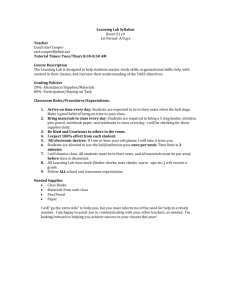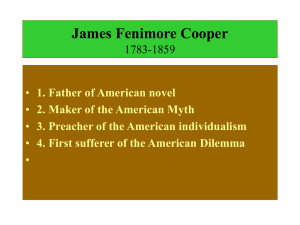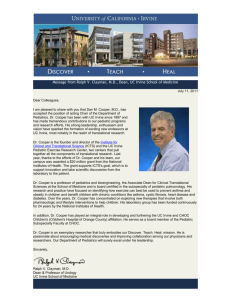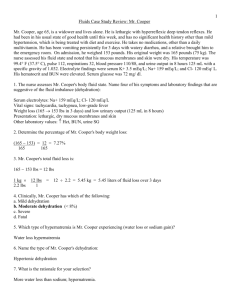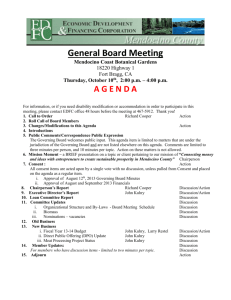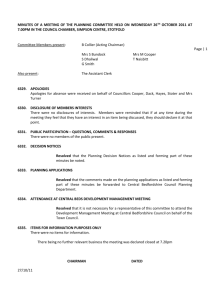Identity Paper
advertisement
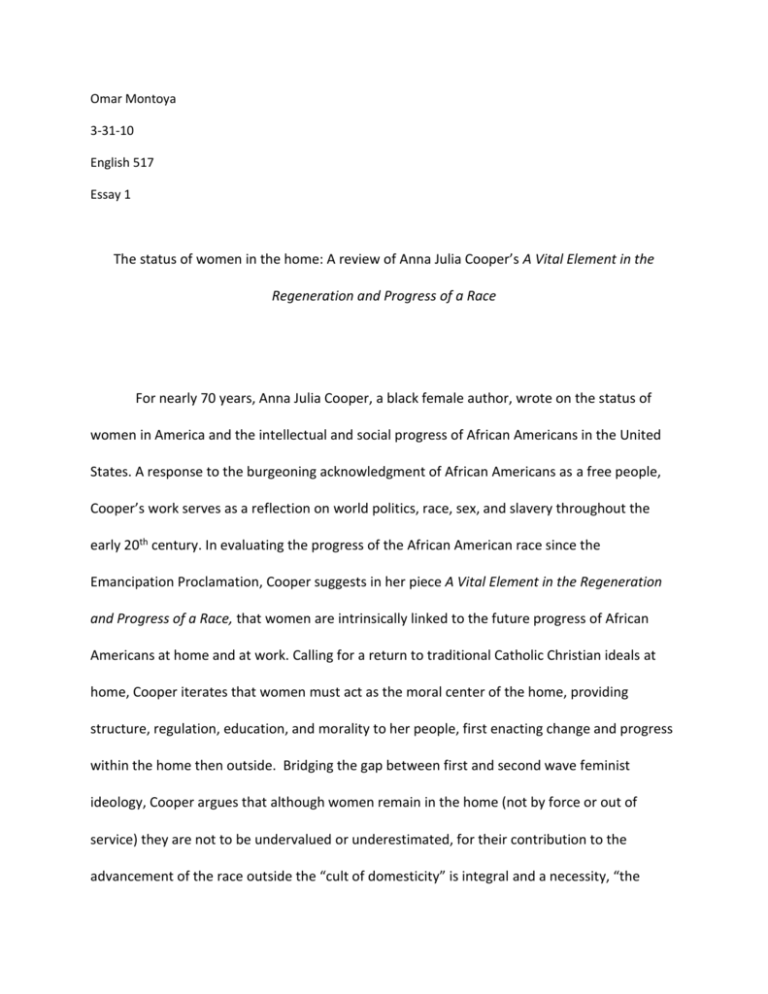
Omar Montoya 3-31-10 English 517 Essay 1 The status of women in the home: A review of Anna Julia Cooper’s A Vital Element in the Regeneration and Progress of a Race For nearly 70 years, Anna Julia Cooper, a black female author, wrote on the status of women in America and the intellectual and social progress of African Americans in the United States. A response to the burgeoning acknowledgment of African Americans as a free people, Cooper’s work serves as a reflection on world politics, race, sex, and slavery throughout the early 20th century. In evaluating the progress of the African American race since the Emancipation Proclamation, Cooper suggests in her piece A Vital Element in the Regeneration and Progress of a Race, that women are intrinsically linked to the future progress of African Americans at home and at work. Calling for a return to traditional Catholic Christian ideals at home, Cooper iterates that women must act as the moral center of the home, providing structure, regulation, education, and morality to her people, first enacting change and progress within the home then outside. Bridging the gap between first and second wave feminist ideology, Cooper argues that although women remain in the home (not by force or out of service) they are not to be undervalued or underestimated, for their contribution to the advancement of the race outside the “cult of domesticity” is integral and a necessity, “the fundamental basis for hope chiefly residing on [them] and [their] influence within the home” (Cooper, 55). According to Cooper, “you may judge a nation’s rank in the scale of civilization from the way that they treat their women” (Cooper, 55) a most high regard for them, a prolific idea that she suggests was first ingrained into European civilization by the Catholic Church and the feudal system; the habits of life and modes of thought which both gave rise to chivalry, “that which no other institution has more sensibly magnified and elevated woman’s position in society” (Cooper, 55). Dwelling on the tender regard women were entertained by the rugged barbarians of Europe before they left their homes to overrun the country, Cooper suggests that a love and veneration for their (women’s) pure and noble influence charmed the barbaric nature of men from completely plundering and pillaging all. For Cooper, Catholicism and chivalry merely gave a roseate glow to the barbarism that was occurring outside the home, and what she fails to recognize is that the respect for the women she alludes too, heralded by the feudal system, was only reserved for a select few, and for those lower on the typical hierarchical caste system, those conquered and killed in the name of God by chivalrous men, merely suffered the unlovely commonplace that was often reserved for slaves and or property. Historically basing her claim upon the gradual progression of Catholic Christian ideals juxtaposed against the feudal system, Cooper espouses that the advent of Catholicism has venerated women, tenderly regarding them as equals, cherishing them for their pure and noble influence in the home—the wife, the sister, the mother, all valued by Christ, because it was he, who on his dying bequest signified the protection and tender regard for his sorrowing mother and afterward to the sex that she represented “throughout his life [he] has given to men a rule and a guide for the estimation of women as an equal, as a helper, as a friend, and as a sacred charge to be sheltered and cared for with a brother’s love and sympathy” (Cooper, 57); forever materially fostering and magnifying her position in society. Arguing that women have been ordained a special place in the home, according to God, venerated, and to be respected, Cooper contradicts herself by inferring that while at the same time woman are to be cherished, they can only truly “teach” and control the house by using other means of influence. Contrasting her historical representations of woman as revered, honored, meek and cared for, she offers no explanation for the dichotomy she creates in portraying women as the seducer and tamer “dazzling men by gorgeous spectacle…she [can] not capture him by physical force…next she only [takes] advantage of the barbarians sensuous love of gaudy display by putting all her magnificent garments on” (Cooper, 58). Suggesting that women are to be revered, while at the same time respected for their ability to control, no matter the measure or circumstance, suggests that the holy honor and regard of the vitalizing principle of a women’s development and amelioration is not formulaic or as innocent as Cooper suggests, but rather perfected in a culture who would use Christianity and chivalry as their estimation for society, enforcing diplomacy and social rule, so as far as that the church is coincident with the progress of a race and or culture. Now it seems not too much to say then that of the burgeoning sentiment of first wave feminist ideology that was occurring when Cooper wrote her piece; the call for women to be respected in and out of the home, that they did not need the protection and care of their male brethren, but were capable on their own, that Cooper bridges the gap between the progress of first wave feminism and second wave feminism by rhetorically juxtaposing her claim that women were to be cared for and protected while at the same time venerated and given equal right and equal representation within the home, “regardless of her rank, wealth, or culture, [she] today remains the estimation of her race, the helper and the friend” (Cooper, 56), against a later second wave ideology which argued that women were independent, capable of making their own way outside the home; a necessary occurrence Cooper suggests in making “gigantic strides in the knowledge of arts, and sciences, social and ethical principles which vitalize and regenerate her people” (Cooper, 56-57). Now this is not to say that women are better, wiser, or stronger than man, but that according to Cooper, it is “women who must first form the man and home by directing the earliest impulses of their character” (Cooper, 59). Comparing nations destitute of this “female” force with other nations among whom the influence of women is prominent, evidence would suggest that the position of women within society determines the vital elements of progress for that society, “to trifle with it, to ignore or misuse it, is to treat lightly the most sacred and solemn trust confided by God to humankind” (Cooper, 59). For Cooper, the training of children and men is a task on which an infinite of possibilities is available; through her she provides morality and balance to society and a civilization, reinforcing the good or evil elements of the world. With the facts of women’s influence on society outlined as such by Cooper, what then are the practical bearings on the work and agency of the woman in the regeneration and progress of a race? Is it merely the estimation to lead and direct the home and children for the honor and glory of God and their salvation? Be as it may the failures and achievements of a race, a woman’s influence on a home cannot be measured in the success or failure of the indoctrination of her home and family. What of the possible existence of the “other” woman, that which does not suggest or believe the underpinnings for social progress and change are founded upon Christian Catholic fundamentals? What of a single woman, a woman with no children, a lesbian woman? Are they refuted the responsibility of educating the future generations of the race, merely because they do not espouse to the fundamental Christian ideals that Cooper posits? Clearly basing her claim on the sole advent of Catholicism with the home and residing all responsibility on the singular definition of a woman that Cooper portrays, offers little for the true progress of second wave feminist ideology, and suffice it to say, this is the reason that Cooper unsuccessfully positions her work within the framework of the second wave movement is her failure to offer no comparative depiction of woman she portrays, only she, relinquishing total control to Gods will can evoke progress. According to Cooper, true progress is never made by spasms, but real progress is growth. It must first begin with a seed, a woman, “to encourage and inspire us in the advancement of individuals” (Cooper, 61). It is well enough to pause for a moment for retrospection, introspection, and prospection, to look back and not become inflated with the conceit of the depths from which the African American race has risen, but as Cooper would suggest, to learn wisdom from experience, “to gather together our forces, and by improved and more practical methods, address ourselves [women] the task of guiding and directing [our] children” (Cooper, 62) and surveying the “failures or achievements of the past, the difficulties and embarrassments of the present, and the mingled hopes and fears for the future” (Cooper, 61). The fundamental agency under God in the regeneration and retraining of the race for Cooper must be the woman. With all the neglects of her past, with all the weakness and debasement that she has suffered, she must stand mute and firm against the thralls of impending social change, for a race cannot be purified from without. Preachers, teachers, and women are the stimulants of the race and provide the conditions necessary for growth according to Cooper. Whatever the attainments of the individual or race may be, unless the home is properly “balanced” by the woman—ordained by God, it can never be regarded with or representative of the whole; that whole which is the undisputed dignity of the woman, according to Cooper, the character of all the parts, a women, that which she makes whole. In resisting a counterclaim to suggest that perhaps women do not embrace their “cult of domesticity” Cooper fails to recognize that what she is truly arguing is a counterclaim to the progressive ideals of feminist ideology. Instead she argues that women, although not forced too, should reside in the home, because it is their inherent, an ordained responsibility to provide morality and balance to their home and children. Not fully embracing firs wave ideology, Cooper does suggest that women be venerated within the home, and that it is their responsibility to go out and educate the “children,” but she fails to truly offer any progressive ideology that suggests the potential for a woman to remain permanently outside the home. Her claim would suggest that although not forced, the proper place for a woman is the home. She can venture outside the home, but only for the task that she has been ordained for, and nothing else, offering no alternative to a life of servitude, and moral responsibility to influence society. When the progressive influence of womanhood on civilization today fails, Cooper suggests it is not because of the failure of the female charge and intention to spread morality and truth, but rather because of the false influence of the “white man’s” Christianity on her people. All other religions other than Catholicism are a product and not a growth, according to Cooper, and it is because of their need to address themselves to the needs of a civilization and people that they become corrupt, incapable of shaping a civilization for the future. Because the white man does not welcome the advancement of the African American he falsely preaches the subjugation of the race and women in the churches he has founded. The “trimming policy” of the Church in the South is both presumptuous and ungrateful, mortifying according to Cooper, because the benevolent wisdom of God has been latently executed, antagonistically halting the progress of the African American in the South. The evangelization of these people is not based on the religious awakening of the holy Catholic communion, but rather based upon a perpetual religion carefully crafted by the white man for the sustainability of a slave caste system. All other religions other than Catholicism are a product, designed to provide a means of service and salvation, intended to spur the growth of that particular religion. Ironically, it is this very claim that counters Cooper’s suggestion that Catholicism is the only “true” religion, because just as other religions, Catholicism offers a product served, a means for assimilation based upon the agenda of those at the head of the church. In other words, the Catholic church offers nothing different, nothing truer than other religions, because it is merely emulating or being emulated to preach a gospel believed as fact (all other religions offer the same claim, and offer the same preaching, that they are the one “true” religion, and all others false). To return, however, to a less broad “false” view of Christianity, Cooper suggests that it is necessary for women to become church trained (officially, or simply self indoctrinated) for the protection and uplifting of the race. The denomination that must espouse the proverbial emotionalism of “Negro” worship in the South, must be the Catholic Church, having already established industrial and training schools in every community in the South, enriching and infusing “vigorous young hearts, healthy heads, and helpful hands” (Cooper, 69) for the advancement of the African American race. For Cooper, true advancement of the race will only occur when Catholic traditions are embraced, not these “false” religions, and when woman are truly venerated for their guidance and direction, thought of as equals, and allowed to progressively father the principles of education and morality in and out of the home. Grappling with this claim, what Cooper’s ideology fails to acknowledge is the availability or exposure to any alternative interpretations of the Christian (Catholic) doctrine, simply equating only Catholicism with her idea of “true” religion, Cooper offers no illumination for her biased resentment for all other religions other than Catholicism, equating them merely with the continual progression of the white man’s hold upon the African American Race. Providing no evidence to support her claim, she seemingly assumes that ordained by God, the historical advent of Catholicism and chivalry has only fostered the progression of the African American race, and offers no evidence to suggest the Church historically has espoused the advent of crusades, mitigated the white mans control over the African American race, controlling them and subjugating them to rule, merely because it has been ordained by Gods will. Clearly Cooper’s work as canonical inclusion in the works of feminist ideology is warranted, so far as that woman emulate the particular portrayal of the woman she depicts. Offering no alternative to the contrary, a woman who does not fit within the parameters prescribed cannot be truly successful in the advancement and progress of her race, because she does not laud the hold the ordained role of a woman as defined by God; a God that only serves within the Catholic tradition and does not exist outside the confines of the traditional matriarchic that defines the role of women Cooper suggests. Carefully traipsing the lines between progressive feminist ideology and the more traditional “cult of domesticity” portrayed, Cooper fails to offer a truly progressive poignant claim which would suggest that the nature and role of the woman is a necessity for the advancement of the African American race. Bibliography Cooper, Anna Julia. "Womanhood: A Vital Element in the Regeneration and Progress of a Race." Cooper, Anna Julia. The Voice of Anna Julia Cooper. Lanham, MD: Rowan and Littlefield Publishers, 1998. 53-71.

